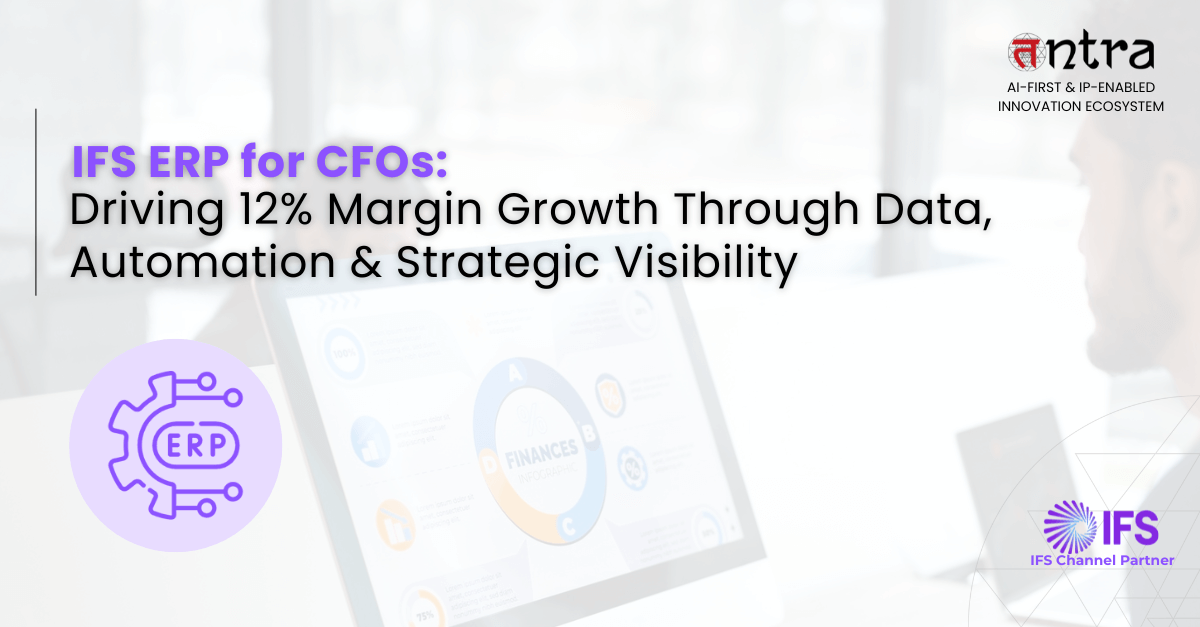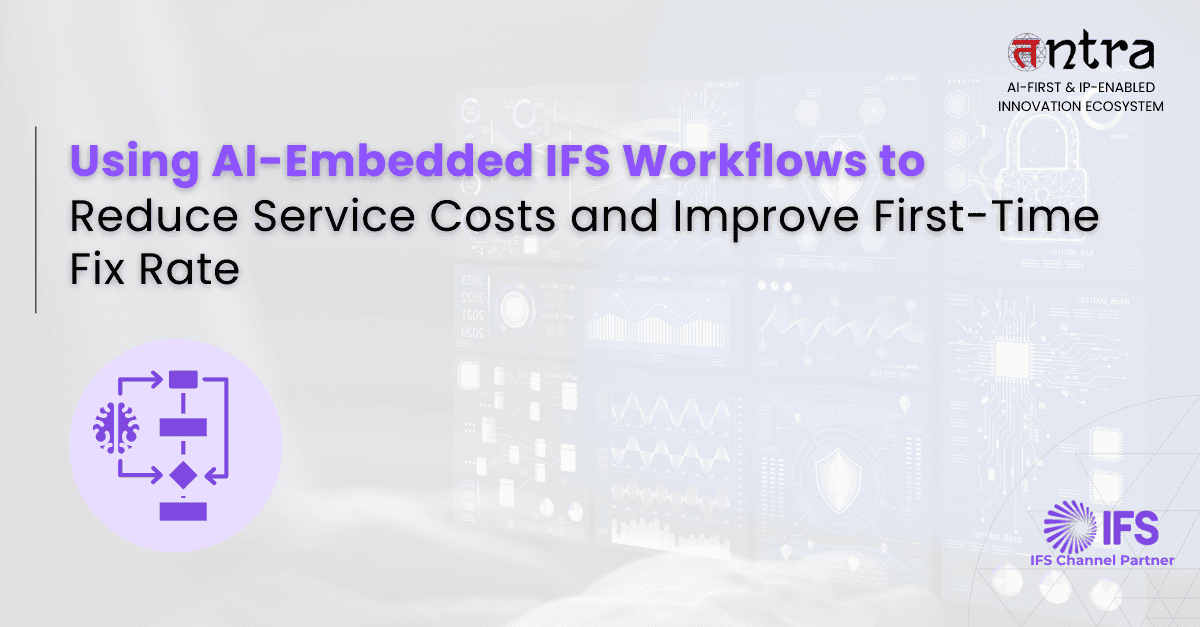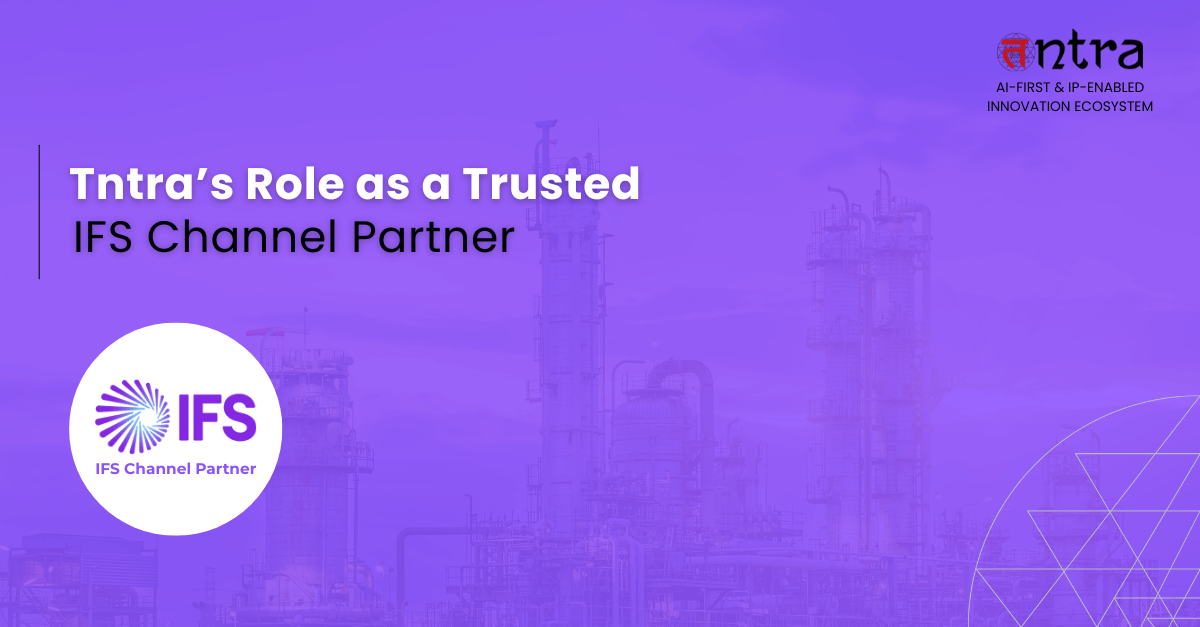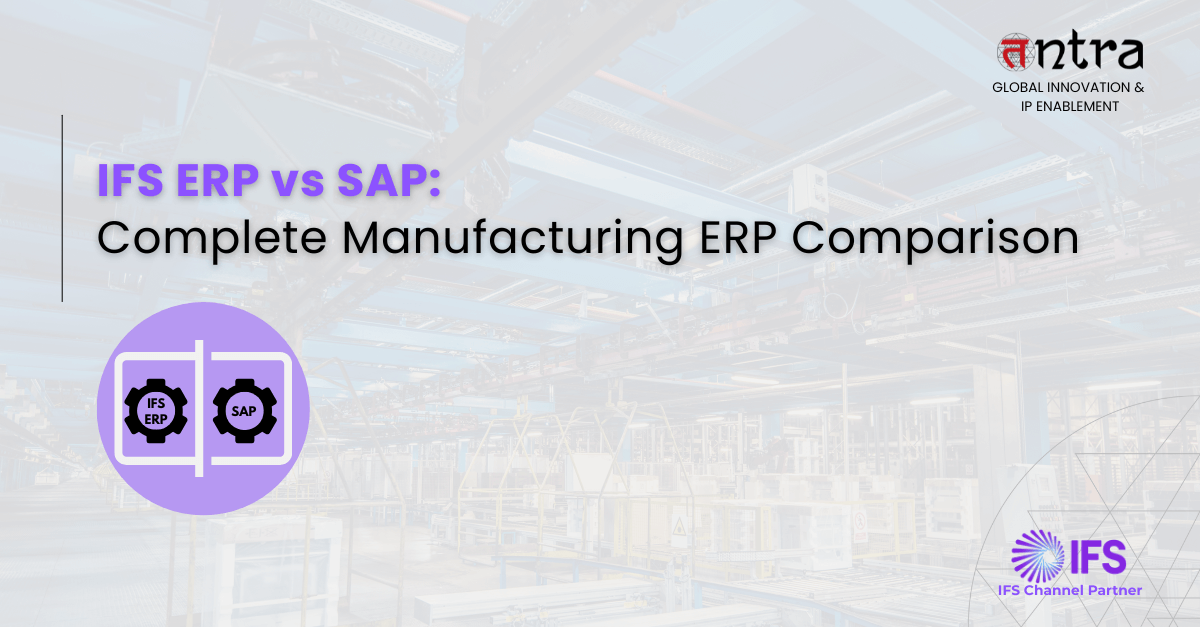
IFS ERP vs SAP: Complete Manufacturing ERP Comparison 2025
Table of Contents
ToggleThis article offers a comprehensive comparison of IFS ERP and SAP from a manufacturing perspective, highlighting differences in philosophy, industry fit, and implementation. SAP excels in large-scale, standardized production, while IFS shines in complex, project-driven, asset-intensive environments. The piece examines key factors such as cloud capabilities, cost structures, user experience, and Industrial AI integration. Real-world examples illustrate how each platform handles scheduling, asset lifecycle, and operational agility. The takeaway: there’s no one-size-fits-all, your best ERP depends on your manufacturing model, complexity, and strategic priorities. Continue reading to learn more.
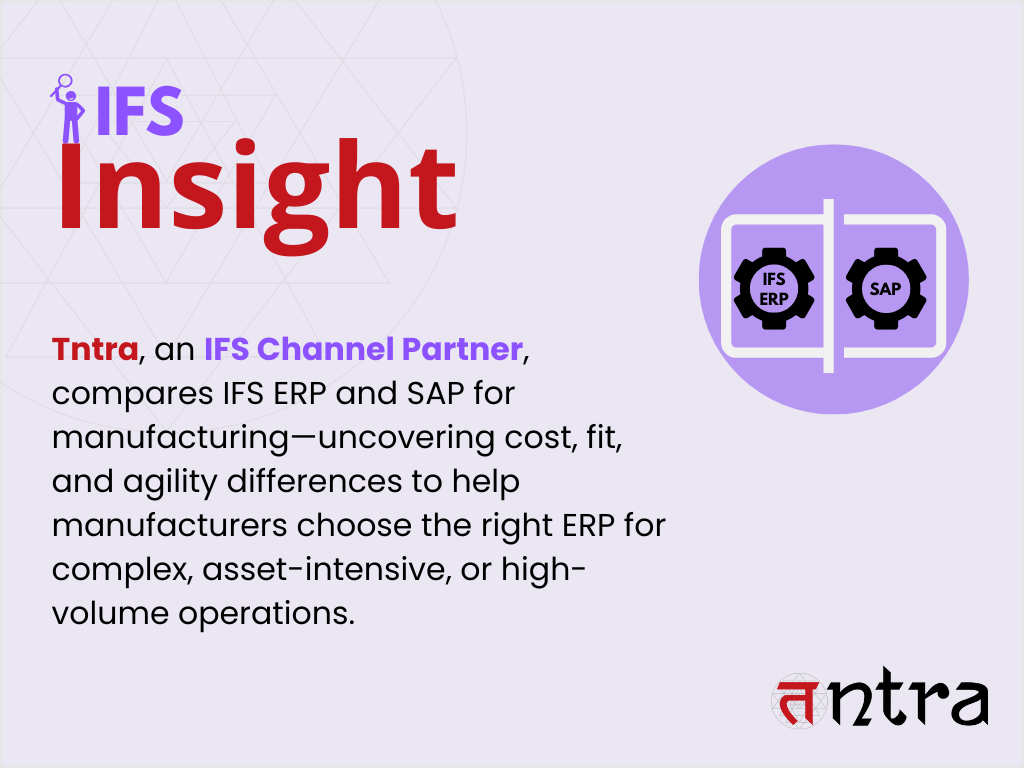
If you’ve worked in manufacturing for more than a minute, you know one universal truth: efficiency is everything.
Margins are tight, supply chains are complex, and customer expectations are high.
The right ERP system can be the difference between running a well-oiled operation and fighting fires every single day.
And when it comes to ERP for the manufacturing industry, two names dominate the conversation: IFS and SAP.
Both are giants. Both are powerful. But their approach, especially for manufacturing, is very different. And if you’re comparing IFS ERP vs SAP for your next big ERP investment, the details matter.
The Big Picture: IFS ERP vs SAP
Let’s get this out of the way: this isn’t a “one is bad, one is good” conversation. Both IFS and SAP are strong contenders for manufacturing companies. The real question is: Which is right for your business model, your culture, and your future plans?
At a glance:
- SAP has brand recognition and a massive global footprint. It’s been the safe corporate choice for decades.
- IFS is the specialist, deeply focused on industries like manufacturing, aerospace, defense, energy, and service.
When you dig into IFS vs SAP ERP from a manufacturing perspective, you start to see some critical differences.
SAP ERP vs IFS ERP: The Philosophy Gap
Think of SAP as a “mega mall” of ERP. It has everything you could ever want, but navigating it can be overwhelming, and you might end up paying for far more than you’ll actually use.
IFS, on the other hand, is like a “tailored workshop.” It’s purpose-built for complex, asset-heavy industries, so you’re not starting with a generic system and bolting on dozens of add-ons just to make it work for manufacturing.
Manufacturing reality check:
- SAP can handle manufacturing, but it’s not just for manufacturing. It’s for every industry under the sun, so you often need customizations to fit your processes.
- IFS starts with manufacturing in mind. Features like project-based production, advanced maintenance, and asset lifecycle management aren’t extras, they’re core.
IFS Cloud vs SAP S/4HANA: Modernization Approaches
If you’re looking at cloud deployments, you’re really comparing IFS Cloud vs SAP S/4HANA. Both are their next-gen platforms, designed to replace legacy on-premises systems.
- IFS Cloud delivers ERP, EAM (Enterprise Asset Management), and FSM (Field Service Management) in a single platform. Updates are rolled out twice a year, and you can run it in the cloud, on-prem, or hybrid.
- SAP S/4HANA is SAP’s in-memory database platform that promises speed, analytics, and integration. It’s cloud-ready, but many manufacturing companies still run hybrid setups due to the complexity of migration.
For manufacturers, the real difference is agility. IFS Cloud tends to be lighter, faster to deploy, and easier to update, while S/4HANA, although powerful, can involve long project timelines and higher change management overhead.
IFS ERP vs SAP: The Manufacturing-Specific View
IFS ERP for Manufacturing
IFS has manufacturing DNA. It’s especially strong in:
- Engineer-to-order (ETO) and configure-to-order (CTO) models.
- Complex project manufacturing.
- Asset-intensive environments where maintenance, repair, and overhaul (MRO) are critical.
It excels in industries like aerospace and defense, industrial manufacturing, and heavy equipment, where manufacturing is part of a bigger service or project lifecycle.
SAP ERP for Manufacturing
SAP is a powerhouse in discrete and process manufacturing, especially for global corporations with multiple lines of business. It’s strong in:
- High-volume, standardized production.
- Integration with finance, HR, and procurement at massive scale.
- Global supply chain orchestration.
That said, SAP’s manufacturing strengths shine brightest in highly standardized environments. If your operations are more complex, unique, or project-driven, you’ll likely face more custom development.
Best ERP for Manufacturing Industries: Context Matters
If your manufacturing is:
- High volume, low variation, global scale → SAP may be the best fit.
- Project-driven, service-heavy, asset-intensive → IFS is likely the more natural choice.
The truth? There’s no universal “best ERP for manufacturing companies”, only the best fit for your unique mix of complexity, growth plans, and operational needs.
Real-World Comparison: Production Scheduling
- IFS: Built-in tools for project-based scheduling that link directly to service and maintenance workflows.
- SAP: Robust scheduling options, but often requires integration with specialized tools for complex project manufacturing.
Real-World Comparison: Asset Lifecycle
- IFS for Manufacturing: Asset lifecycle management is native, meaning manufacturing, maintenance, and service share the same system of record.
- SAP: Has asset management, but it’s often a separate module with different licensing and integration layers.
Real-World Comparison: User Experience
Manufacturing teams often complain about ERP interfaces being too “corporate” and not intuitive for shop floor realities.
- IFS focuses on role-based, clean UI that frontline teams can adopt quickly.
- SAP’s Fiori interface is modern but still has a steeper learning curve for non-technical users.
Implementation Timelines
Manufacturers can’t afford to pause operations for 18 months while implementing a new ERP.
- IFS implementations, especially in manufacturing, are often shorter due to industry focus and out-of-the-box fit.
- SAP implementations can be longer, especially for global rollouts, because of scope and complexity.
Cost Structures
While exact costs vary, the patterns are familiar:
- SAP’s licensing, infrastructure, and ongoing maintenance tend to be higher, partly due to its enterprise-wide scale.
- IFS offers more modular pricing, so you pay for what you use, not the entire mega suite.
Support and Ecosystem
- SAP: Massive ecosystem, with thousands of consultants and partners worldwide.
- IFS: Smaller ecosystem, but highly specialized for the industries it serves, including manufacturing.
Why Many Manufacturers Choose IFS Over SAP
It often comes down to:
- Fit for complex manufacturing models.
- Faster time to value.
- Integrated asset, project, and service management.
That said, SAP remains a strong choice for large, diversified enterprises looking for a single, massive ERP backbone.
How IFS Delivers the Modern Tech Edge in Manufacturing ERP
In the modern manufacturing landscape, ERP selection isn’t just about features, it’s about how your ERP can help you innovate, adapt, and lead. That’s where the next set of factors come in.
Industrial AI and Manufacturing ERP
The integration of Industrial AI is changing the game. Predictive maintenance, quality control, and demand forecasting are now embedded in ERP workflows.
IFS has been embedding AI directly into maintenance and service modules, while SAP leverages AI through its Business Technology Platform.
IFS ERP Applications for Manufacturing
IFS ERP delivers comprehensive manufacturing ERP solutions for both discrete and process manufacturing environments. Core applications include supply chain management, production scheduling, asset management, field service, and project management — all unified in one platform for seamless data flow and faster decision-making.
For manufacturers comparing ERP options or asking which ERP is better for manufacturing, IFS or SAP, IFS offers cloud ERP for manufacturing with AI-driven predictive maintenance, IoT integration, and robust multi-site management capabilities.
IFS ERP Solutions for Manufacturing
Modern IFS ERP solutions aren’t just about running the plant, they extend to customer service, aftermarket sales, and warranty management. For manufacturers, that means a tighter link between building the product and supporting it through its entire lifecycle.
IFS ERP Implementation Services for Manufacturing
Getting ERP right in manufacturing is about more than software. IFS ERP implementation services focus on mapping real-world shop floor processes to the system, ensuring the tech supports, not disrupts, production.
IFS Consulting Services
With IFS consulting services, manufacturers gain industry-specific ERP expertise tailored to manufacturing operations — not just a generic ERP setup. Our consultants understand the complexities of manufacturing BOMs, regulatory compliance, and maintenance cycles, ensuring your ERP aligns with real-world shop floor needs. From ERP implementation for the manufacturing sector to post-deployment optimization, we help you unlock the full potential of IFS ERP for industrial manufacturing.
The IFS ERP Ecosystem
The IFS ERP ecosystem is built around a powerful, flexible, and modular IFS ERP system designed for complex manufacturing and service-driven environments. With IFS Cloud ERP, organizations get a unified platform for manufacturing, enterprise asset management (EAM), and field service management (FSM) — all continuously updated and deployable in the cloud, on-premises, or in hybrid models.
Backed by highly experienced IFS ERP consultants, companies receive industry-specific expertise to align ERP strategy with real-world operations. Through our comprehensive IFS ERP Consulting Service, we provide end-to-end guidance — from process mapping and configuration to seamless adoption — enabling manufacturers to achieve faster ROI and long-term operational excellence.
Choosing Between IFS ERP and SAP in Manufacturing
If you’re weighing IFS ERP vs SAP, the choice often comes down to a few big questions:
- Is manufacturing your core complexity, or just one of many lines of business?
- Do you need project, asset, and service management tightly integrated with manufacturing?
- How quickly do you need to see value from your ERP investment?
For high-volume, standardized global manufacturing, SAP remains a proven choice.
For complex, project-driven, service-heavy manufacturing, IFS often delivers a better fit, with faster adoption and lower total cost of ownership.
Driving Manufacturing Success with the Right ERP Choice
Selecting between IFS ERP and SAP is more than a software decision—it’s about aligning your operations, strategy, and long-term vision with the right technology partner. While SAP brings scale and breadth, IFS stands out for its manufacturing-first approach, faster deployment, and built-in capabilities for complex, asset-intensive, and project-driven environments.
In today’s competitive manufacturing landscape, the ERP you choose will directly influence efficiency, agility, and profitability for years to come. That’s why working with experts who understand the nuances of your industry is critical.
At Tntra, our IFS ERP Consulting Service helps manufacturers not just implement technology but transform their entire operational model. From process mapping to seamless integration and training, we ensure your ERP investment delivers measurable business value—fast.
Ready to optimize your manufacturing operations with a purpose-built ERP?
Talk to our IFS ERP Consulting experts today and take the first step toward smarter, faster, and more agile manufacturing.
FAQs
What is the future of ERP in manufacturing?
ERP in manufacturing is moving toward cloud-based, AI-powered, and industry-specific systems with real-time visibility, predictive maintenance, and supply chain automation.
What is the fastest-growing ERP system in the world?
IFS ERP is among the fastest-growing globally, driven by its industry focus and faster time-to-value in manufacturing and asset-heavy sectors.
Is IFS ERP better than SAP for manufacturing companies?
ERP is a category; SAP is a vendor. SAP is powerful, but IFS can be better for manufacturers needing flexibility and lower costs.
Which ERP system is faster to implement—IFS ERP or SAP?
IFS ERP generally has a shorter implementation timeline thanks to pre-configured industry templates and composable architecture, while SAP deployments may take longer and require more extensive integration work.
How does IFS ERP compare to SAP S/4HANA?
IFS provides faster deployment and modular flexibility, while SAP S/4HANA offers deeper enterprise-wide integration but with longer timelines.
What industries benefit most from IFS ERP?
Aerospace, defense, manufacturing, construction, and energy gain most from IFS due to its strong asset and project management tools.
 Download IFS Guide
Download IFS Guide 